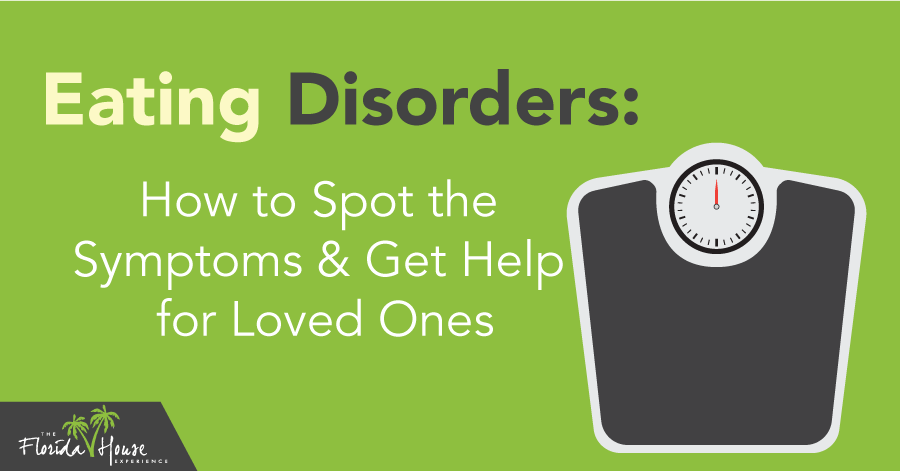
An eating disorder is a serious health condition involving eating behaviors that impact physical health, mental health, and emotional well-being. Eating disorders are not as uncommon as they may seem. The National Institutes of Mental Health reports that binge eating occurs in 1.2 percent of the adult U.S. population, bulimia nervosa in 0.3 percent and anorexia nervosa in 0.6 percent of the adult U.S. population. Conditions like these, along with co-morbidity with other mental disorders, can make eating disorders life-threatening.
Many people who struggle with eating disorders cannot stop on their own and need help to do so. However, for loved ones watching a family member or friend battle this condition, it’s not easy to know when to seek out help. Understanding the symptoms of eating disorders can help sufferers get the help they need.
What Are the Symptoms of an Eating Disorder?
Eating disorders come in a wide range of forms, each with different typical symptoms. Most notably, a change in eating patterns, binge eating, excessive exercise or a negative body image are common signs of an eating disorder. Here are some of the most common eating disorders and their symptoms.
Binge Eating Disorder
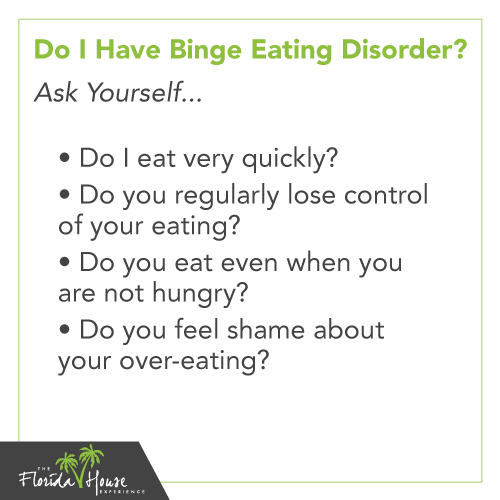 Individuals who have a binge eating disorder typically eat too much food in a short amount of time. They lack control over their eating. Symptoms include:
Individuals who have a binge eating disorder typically eat too much food in a short amount of time. They lack control over their eating. Symptoms include:
- Eating very quickly
- Eating more than they planned to eat
- Feeling uncomfortable, often painfully full
- Eating when not hungry
- Feeling disgust, shame, and guilt after eating
One key sign of this condition is the lack of change after feeling this way. In a healthy individual, eating a large meal or overeating during the holidays triggers the need to refocus to lose weight and gain improved health. For those with a binge eating disorder, the difference is that those affected don’t try to overcompensate for their eating. They do not exercise. Most do not display symptoms of anorexia or bulimia either — they do not try to purge after eating.
Bulimia Nervosa
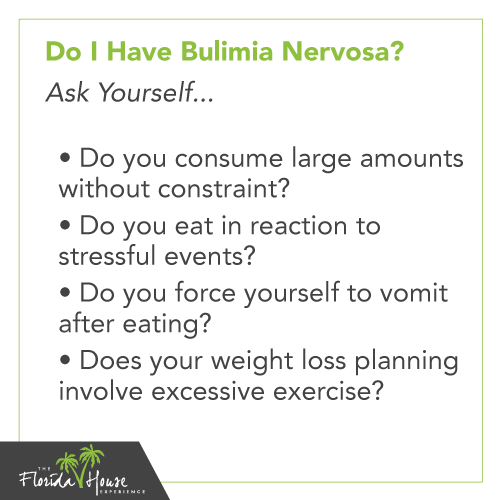 Commonly called simply bulimia, this serious condition typically causes people to lack any control over their eating. They have periods of binge eating followed by instances of purging. Because of the type of damage this can cause to the body, it can be a life-threatening condition requiring immediate medical care. Signs of bulimia include:
Commonly called simply bulimia, this serious condition typically causes people to lack any control over their eating. They have periods of binge eating followed by instances of purging. Because of the type of damage this can cause to the body, it can be a life-threatening condition requiring immediate medical care. Signs of bulimia include:
- Restrictions on eating during the day, often leading to binge eating later
- Eating a large amount of food in a short period of time
- Ridding the body of calories after bingeing in an unhealthy way, such as purging
- Fear of weight gain, which causes sufferers to exercise heavily or use laxatives to lose weight
- Feelings of guilt and shame
Many with this condition are focused on the way their body looks and what their weight is. Most often, those affected are very harsh on their own body image, even when others don’t make comments about weight. Many with bulimia are at a healthy weight but don’t believe they are.
Food Intake Disorder
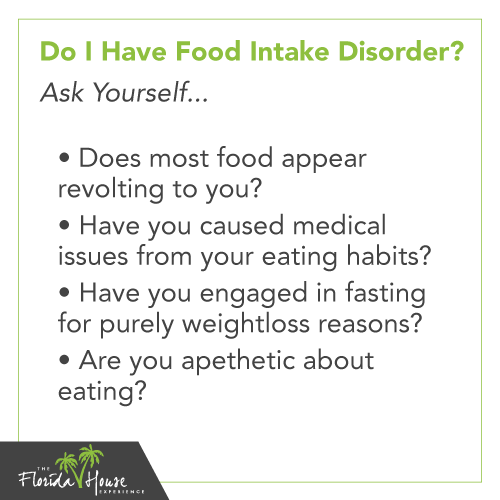 Food intake disorder, also called avoidant/restrictive food intake disorder, is another form of eating disorder. Here, an individual simply does not get the nutrition necessary because of their lack of interest in or unwillingness to eat. Signs include:
Food intake disorder, also called avoidant/restrictive food intake disorder, is another form of eating disorder. Here, an individual simply does not get the nutrition necessary because of their lack of interest in or unwillingness to eat. Signs include:
- Avoiding food due to sensory problems — such as not liking the taste, smell, color or texture of a food
- Worry about the consequences of eating, such as a fear of choking
- Lacking any real interest in eating
Those with food intake disorder are not worried about gaining weight. They are also not able to simply eat. The problem is that this type of disorder or limited eating leads to nutritional deficiencies, weight loss and a failure to gain weight.
Anorexia Nervosa
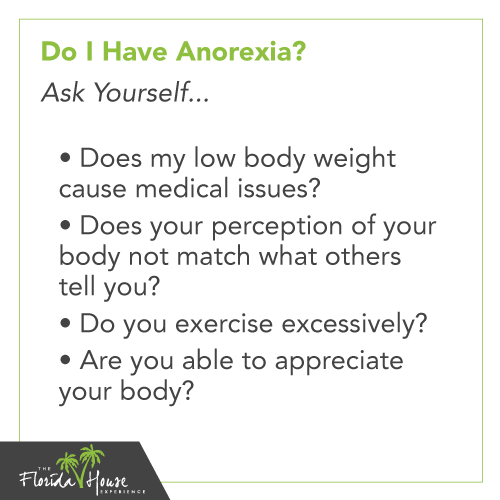 Commonly called simply anorexia, this eating disorder can also be a life-threatening condition requiring immediate help. People with anorexia typically have very low body weight and a strong sense of fear associated with gaining weight. Signs of this condition include:
Commonly called simply anorexia, this eating disorder can also be a life-threatening condition requiring immediate help. People with anorexia typically have very low body weight and a strong sense of fear associated with gaining weight. Signs of this condition include:
- Low body weight, often at an unhealthy level
- Efforts to control their body shape or weight
- A bad perception of their weight or their shape — they lack any real ability to see their body as healthy
- Vomiting after eating
- Excessive exercise to control shape or weight
Those with anorexia typically believe that their body’s weight or shape is poor. They look for excessive ways to lose weight or control their body image, which can but does not always include purging. They may use laxatives or seemingly always be on a diet. This condition can create an underweight and unhealthy body, which can sometimes culminate in outright self-starvation.
When to Help a Loved One to Get Help
There are some key signs that your loved one needs to seek immediate help for their eating disorder. This includes instances such as:
- Not eating meals or making excuses for why they don’t need to eat
- Excessive exercise to a point where it becomes obsessive
- Focusing on healthy eating but to an extreme that impacts their daily lives
- Refusing to eat meals prepared by family
- Consuming large amounts of foods, especially high-fat and high-sugar foods, then purging
- Constant talk of needing to lose weight
- No longer willing to engage in social activities
- Using herbal products, laxatives, supplements, and diet products heavily
- Eating in secret
- Depression, shame or guilt in relation to food
If you notice these or similar signs of an eating disorder in your loved one, seek out help. Eating disorders are unhealthy, and they can also spiral out of control quickly even in a person who seems to look and act normally. If a loved one with an eating disorder does not seek out help, it’s possible the condition can become life-threatening.
Finding Help for Eating Disorders
People with any signs of eating disorders should seek help immediately. Our team at FHE Health is here to help. If you believe your loved one has an eating disorder, engages in excessive exercise or has a negative body image, it’s time to take action. Therapy and ongoing medical support can help sufferers overcome their disorder to rebuild long-term physical and mental health. Most importantly, recognize that those with eating disorders cannot just stop their behavior — they need reliable help from an experienced professional in this field. FHE Health can provide eating disorder treatment to you.






